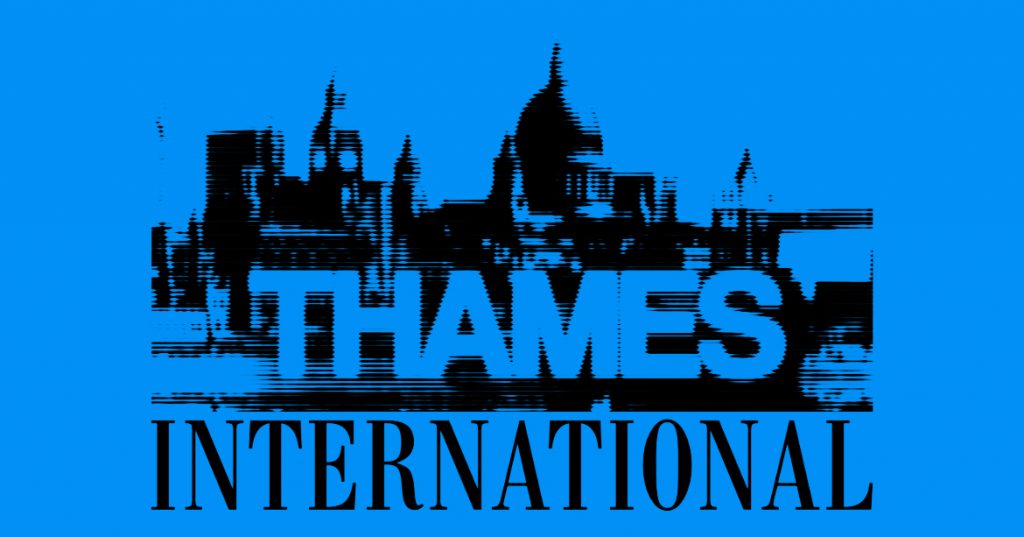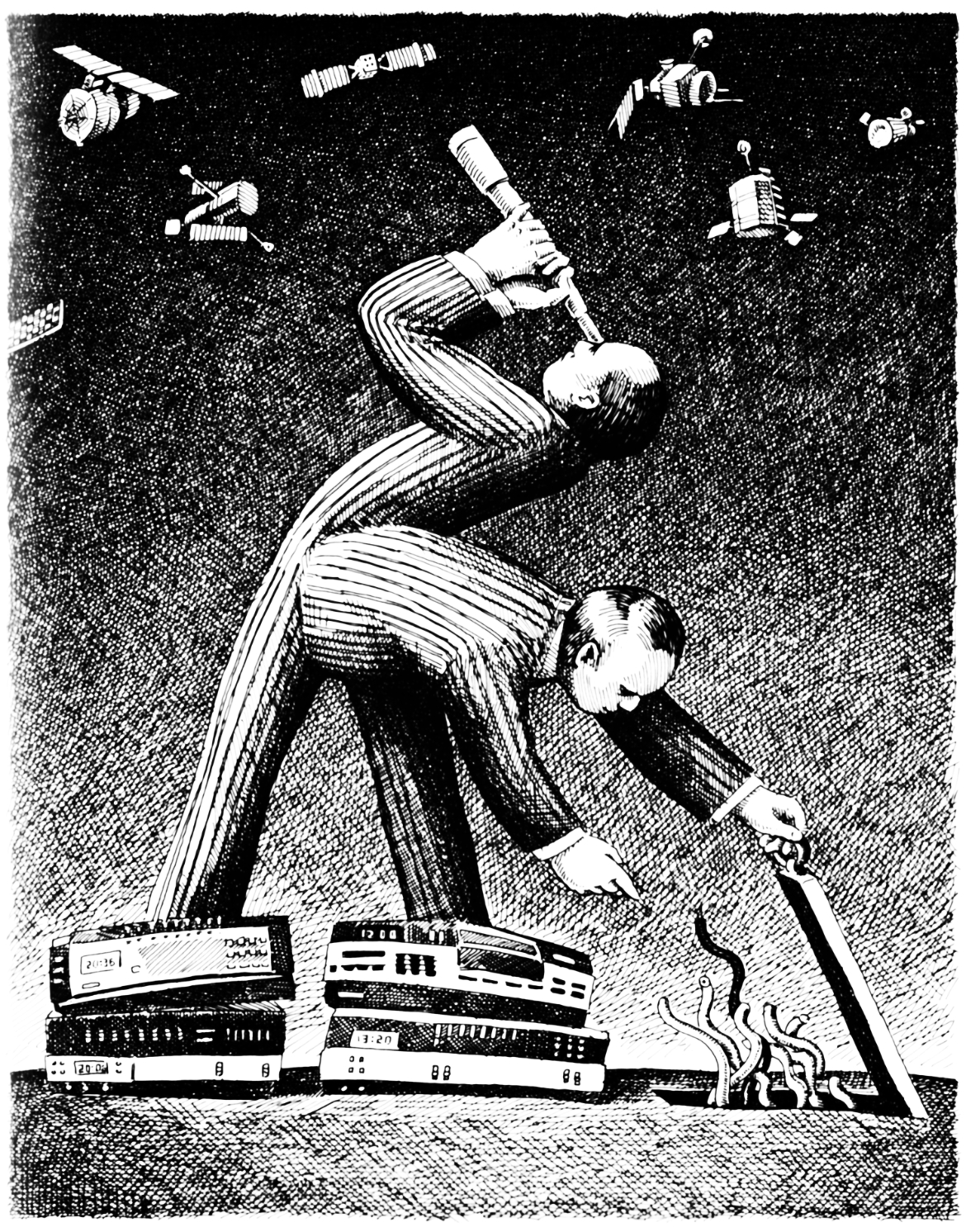The sky’s the limit
Satellites and videotape are about to become common. Thames Television International is ready

Television journalist Patrick Stoddart looks at the imminent revolution in broadcasting

Keeping one eye on the sky, another underground and both feet planted on the floor is a good trick if you can do it. And that is exactly how Thames Television International is exploiting the rich income promised by new television technology.
The sky eye is on the lookout for broadcast satellites, the underground eye for cable connections, and the firmly-planted feet are vital for anyone who wants to understand and explore the coming revolution in the way viewers use their television sets.
There are three potential rivals to the TV companies who at present dominate the airwaves. The first, video, is with us right now. Nearly a million British homes already possess a videotape recorder which gives them access not only to off-air programmes but a large and growing catalogue of pre-recorded films, music shows, look-and-learn cassettes and golden oldie television material.
The second threat comes from Direct Broadcast Satellites (hereafter called DBS). In America, satellites are already beaming programmes to local cable operators who pipe pictures to subscribers. And if the cash and the political consensus can be found, there could be a DBS perched above every country in Europe by 1990.
Cable itself is the third strand. Once again America leads the way, mainly because the cable was needed to improve signal quality. But now, many entrepreneurs provide viewers with an alternative service to the major networks, and American subscribers can buy anything from month-old movies to ‘live’ sex-shows from companies offering up to 50 different channels at the touch of a button.
Britain, of course, is a long way off that stage, and the initial demand for cable might be rather limited. But if the forthcoming experiments in a number of areas already cabled up are successful, fibre optic ‘narrow-casters’ could soon be spreading their tentacles under every street in the land.
If that happens, the search for programming to fill the new hours will be on, and indeed in America, the hue and cry is already at fever pitch.
So instead of fighting the alternative invaders, TTI has concluded that it is healthier to join them, and Thames material is already finding its way into the new markets.

Mike Phillips, who is TTI’s Controller of Commercial Development explains. ‘We’re already deeply involved in video, partly through the High Street outlets of our parent companies, Thorn-EMI and Rediffusion. There are now nine Thames titles in the EMI Video list, and they include Botanic Man, Swan Lake, The World At War and Kenny Everett. There’s a Benny Hill compilation, the Morecambe and Wise Christmas Shows from 1978 and 1980, some marvellous gymnastics, and the first of Alan Ayckbourn’s Norman Conquests plays trilogy, which Thames screened a while back. There’s obviously a great deal more in the pipeline, now that ITV has reached agreement over royalty payments with the talent unions.’
Much of this material will also find itself spinning profits at the rate of 700 revs per minute, when the video disc joins the battle next autumn.
Discs can be stamped in bulk much more cheaply than tape (which has to be run off in ‘real time’). They can provide stereo sound, and their 54,000 picture frames per disc can store vast amounts of information. On the other hand, they can’t record, and two, (possibly three) incompatible systems are already vying for market share.
Two systems – Philips’ Laser Vision and the VHD disc made by JVC and adopted by Thorn-EMI – use a hard-wearing groove less disc while RCA have developed a cheaper, less-sophisticated disc not unlike a conventional audio LP in appearance. All three are about the size of an ordinary record, played on machines no bigger than a music centre. The players will sell for between £350 and £5(M), and the discs for around £15.
The Thorn-EMI/Rediffusion connections will ensure Thames a prominent place in the market. When launch day comes next year, Everett, Bellamy & Co will be on show in up to 7,000 rental and retail outlets in the chain of wholly-owned or contracted Thorn-EMI and Rediffusion shops featuring the new VHD disc system. But, says Phillips, Thames material is also available to distributors using the other disc formats, so TTI hope for massive penetration of the new markets as soon as the discs hit the High Street.
As for satellites, Muir Sutherland (TTI’s Managing Director) is still fairly sceptical. ‘The DBS is still a long way off in Britain and Europe and it will take a lot of political will to persuade governments that foreign-owned satellites should be allowed to invade their broadcasting airspace.’
‘And I’m not sure how many viewers will want to spend the money for the big dish aerials; there are still many technical problems in providing a reliable service. Satellites are going to be far more valuable as a means of distributing material to cable operators, as in America.’ Joe McCann (TTI’s Controller of Television Sales) and Don Taffner (their US Representative), have created a lot of interest in these new outlets for Thames programming. They’re finalising sales of Benny Hill to Home Box Office, Napoleon and Love and Swan Lake to CBS, Warner Amex are buying The Tomorrow People for their children’s channel, and other very large deals are close to completion.
‘We think Thames has a huge stockpile of material to offer the new cable operations,’ says Joe, ‘and they are also keen to bring their projects to us as well.’
All sorts of joint-production possibilities are opened to Thames International. But says Mike Phillips, ‘We musn’t get it out of perspective. Co-financing never covers the actual cost of making a programme, but it does help offset the cost and it might help us to go ahead with projects we couldn’t afford on our own.’
In the meantime, TTI is looking at all the new American cable operations and selling appropriate programmes where it can. Thames was offered an exclusive deal with one organisation, much like the deal the BBC has just made with RCTV. one of the cable newcomers, but as TTI already earns more from the USA than the recorded BBC annual guarantee, it prefers to play the field and exploit different markets in different ways.
As Muir Sutherland says, ‘We’re delighted that the BBC have agreed to enter into an exclusive deal in the USA, if only because it means that the other channels can’t get their hands on BBC programmes, and puts us in a stronger position.’
About the author
Patrick Stoddart (1944–2024) was a journalist and presenter, and media editor and television critic of The Sunday Times



